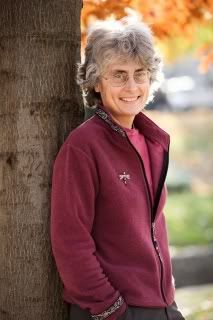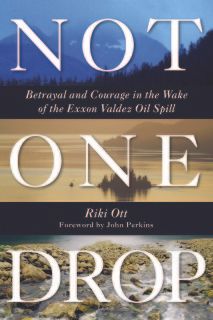( – promoted by buhdydharma )
Crossposted at Air America Radio.
March 24, 2009 marks the 20th memorial of one of North America’s worst ever oil spill. Approximately 11 to 38 million gallons of crude oil from the Exxon Valdez oil tanker spilled into the pristine waters of Prince William Sound destroying a wide range of wildlife habitat and sea life. What we never hear is how the oil spill impacted Alaskan communities within Prince William Sound.
Riki Ott, author of “Not One Drop: Betrayal and Courage in the Wake of the Exxon Valdez Oi Spill” tells the story of Cordova, Alaska, a fishing village trying to recover from one of America’s worst environmental catastrophes. Ott, a resident of Cordova, chronicles the trials experienced by Cordova residents as they cope with the oil spill and one of the longest-running legal battles in the nation’s history. Ott argues that unless we can reinvigorate our democracy and reform a legal system that currently holds corporations above citizens, then America will remain vulnerable to outside corporate influence.
Ott is currently on a nationwide speaking tour and I recently interviewed her about the 20th memorial of the oil spill, Cordova, AK, and how communities can empower themselves from environmental catastrophes.
More below the fold.
“Sound Truth & Corporate Myth$” was the first book you wrote on the Exxon Valdez oil spill and “Not One Drop” is the second to cover what happened. Why did you write a second one and what are some of the things you cover this time around that you didn’t in “Sound Truth & Corporate Myth$?”
Riki Ott: “Sound Truth & Corporate Myth$” is about hard science and how oil is more toxic to people and the planet and hard times. “Not One Drop” is about the soft spots and the paradigm shift that these man-made disasters cause a whole different psycho-trauma to community and what happens when a community falls apart [from an environmental disaster.] How do you mitigate that? There were no models to mitigate man made disaster trauma because up until Bhopal, Chernobyl, Exxon Valdez disasters, everybody was trying to use mitigation models that weren’t working. We became the first case study (Cordova) and we’re the longest ongoing case study on man-made disaster trauma. “Not One Drop” is about what broke, how you deal with it, and more fundamentally, how do we keep our society from breaking. It’s not just oil spills that can cause this.
Today marks the 20th memorial of the Exxon Valdez oil spill. What new information is out there in terms of how this oil spill impacted wildlife habitat, the fishing economy, and family life in fishing communities? What do you know now that we didn’t know 5, 10 or 15 years ago?
We didn’t know oil causes long-term loss. The science had emerged by 2004. But it’s one thing to have scientific papers published and it’s another thing to have public policy to acknowledge an act on the science. We’re still not there. Scientists are still in shock that we never expected the oil to still be liquid, to still be toxic, and to still be seeping into the ecosystem 20 years later.
The federal government and the state of Alaska did ask for the civil settlement for natural resources damage to be re-opened. This is the first time in the history of our country that we had a Clean Water Act settlement re-opened and it was done for technology, not for the oil on the beaches, which was still causing problems. $92 million was asked for and I thought if the government acts, then Exxon had to pay. That’s not true. Exxon had the option to pay and the only other choices were the state and federal governments can drop the issue or the state and federal government can take Exxon to court.
We’re arguing that ‘Yes, there is a problem’ and ‘Yes, it can be mitigated.’ That’s a critical thing because if you can’t prove you can do something about it, then there’s no point in paying $92 million. There’s a mushroom project that’s proven to be much more effective than chemical products, it’s called bio-mediation bacterial mitigation. So what we’re trying to say is ‘Look this is something that could work. So let’s get out there and let’s pay out this money and start figure out how we’re going to get rid of this oil.’
One of the things we learned is that oil companies can get away and not have to acknowledge the long-term harm to the ecosystem or the community. What we’ve had with Exxon is if $5 billion, the original settlement amount in 1994, had been sufficient to punish Exxon and deter future behavior, then Exxon should have been the first rather than the last company to double hull its tankers. What we have operating now in Prince William Sound are tankers without double hulls.
Is there any way to get ExxonMobil to switch them to double hulls?
No, they have them until 2015 and they’re running out the time clock on them. But if $5 billion was enough to get their attention, they would’ve done what Conoco-Phillips did. In 1994, Conoco-Phillips went to double-hull tankers. They made a company decision to go sooner rather than later. What is it going to take for Exxon? That’s a whole different question to hold them accountable because the Supreme Court of the United States (SCOTUS) decision in our Exxon Valdez case, not only came down against us, but set a precedent that there can be a cap on punitive damages as low as a one-to-one ratio with a compensatory. The problem with that is the jury does the best they can but they never get to see all the damages.
There is long term harm on herring. The industry collapsed and fishermen are still incurring harm from the oil spill. We were short changed on the compensation package. So to have the SCOTUS limit one-to-one for us. It didn’t really cut it. The bigger issue for everyone else is the decision took away the public threat of large unlimited liability. Half of the big corporations out there are voluntary accountable to consumer product laws, public safety laws, public health laws, environmental laws, and the reason I say they’re voluntarily is because these companies are too big for any country. If we can’t hold Exxon accountable to people and communities than how can any other countries going to do it if we can’t?
The problem is we have to start looking upstream and say ‘How did they get created and how did they get so big, is it right or do we have to do something about it?’ In “Not One Drop” I say ‘Look, we started our country and framed it with the Bill of Rights.’ The word ‘corporation’ is not in any of those documents’ and people were property then. There were popular movements that sprang up and said ‘This isn’t right’ and drove in amendments to fix those shortcomings. Now we’ve swung completely in the different direction where property is people through judge-made law, not through people-made law.
We’ve only amended the Constitution 27 times. What I’m trying to do is start a movement of the separation of corporation and state. The language [I’ve developed] is only two sentences and it affirms the Constitution and Bill of Rights protections were intended for human people and corporations cannot have them.
Does it come as a shock to most people when you tell them about how this one corporation, its actions, and its efforts have destroyed the family life and other various social aspects of life in Cordova?
It’s new information to everyone. Everybody thought everything was paid off, cleaned up, and back to business as usual. Then I show the sociology data of what’s contributed to the Cordova community: untreated trauma, loss of trust, and litigation. I think Cordova is a mirror for the rest of our nation. Who trusts Wall Street right now? Who trusts the federal government that they’re going to fix this when they’re bailing out the wrong group of people?
Here’s the problem. We need to come together as a people and speak out and identify what our shared values, our common vision, and our common steps [we need to go in]. If you can’t do those things as a community or as a nation, you are vulnerable to other groups who will come in and say ‘I have a plan for you.’ That’s how we got in trouble with the oil and gas companies and those are not things we necessarily wanted.
What are the most important issues that people need to know about the Exxon Valdez oil spill?
The biggies are that oil causes long term harm. The same oil on our beaches are still causing problems not only to wildlife is also making people sick when they go to do oil spill clean-up. People have respiratory and central nervous system problems and chromosome damage.
The other is the Supreme Court took away our tools to defend ourselves. What the SCOTUS did was make every community vulnerable to corporate greed. We have to go back to Congress and say ‘Sorry, this isn’t going to work.’ The SCOTUS overstepped this issue. They’re not supposed to legislating punitive and we need to have Congress take up the issue to hold corporations accountable.
The third is why do we have these big corporations? Why are we even playing this game? We need to change the rules of the game and strip corporations of human rights that were never intended for them to have. I’m not talking about rights from a group that’s bonafide and supposed to have rights. I’m talking about a group that has stolen our rights and we need to say ‘no!’
The fourth is that we changed when people in communities act (and work) together. I think was our biggest lesson. People can make a difference [and tend to when they are in a survivor mode.] We have to get into a survivor mode as a nation and start pulling ourselves together.
To learn more visit the following links:
Dr. Riki Ott, Not One Drop
http://www.chelseagreen.com/tv…
Live Locally: Dr. Riki Ott Urges Us to be Green by Staying Local
http://www.chelseagreen.com/tv…
Black Wave: The Legacy of the Exxon Valdez Trailer
http://www.chelseagreen.com/tv…
Separation of Corporation and State: The 28th Amendment
http://www.chelseagreen.com/tv…
1989 Exxon Meeting in Cordova, AK
http://www.chelseagreen.com/tv…
The Oil Polluting Alaska Twenty Years after Exxon Valdez
http://www.chelseagreen.com/tv…



2 comments
Author